
Doctor is an academic title that originates from the Latin word of the same spelling and meaning. The word is originally an agentive noun of the Latin verb docēre 'to teach'. It has been used as an academic title in Europe since the 13th century, when the first doctorates were awarded at the University of Bologna and the University of Paris.
A mojo, in the African-American spiritual practice called Hoodoo, is an amulet consisting of a flannel bag containing one or more magical items. It is a "prayer in a bag", or a spell that can be carried with or on the host's body. Alternative American names for the mojo bag include gris-gris bag, hand, mojo hand, toby, nation sack,conjure hand, lucky hand, conjure bag, juju bag, trick bag, tricken bag, root bag, and jomo. The word mojo also refers to magic and charms. Mojo containers are bags, gourds, bottles, shells, and other containers. The making of mojo bags in Hoodoo is a system of African-American occult magic. The creation of mojo bags is an esoteric system that involves sometimes housing spirits inside of bags for either protection, healing, or harm and to consult with spirits. Other times mojo bags are created to manifest results in a person's life such as good-luck, money or love.

Medicine is the science and practice of caring for patients, managing the diagnosis, prognosis, prevention, treatment, palliation of their injury or disease, and promoting their health. Medicine encompasses a variety of health care practices evolved to maintain and restore health by the prevention and treatment of illness. Contemporary medicine applies biomedical sciences, biomedical research, genetics, and medical technology to diagnose, treat, and prevent injury and disease, typically through pharmaceuticals or surgery, but also through therapies as diverse as psychotherapy, external splints and traction, medical devices, biologics, and ionizing radiation, amongst others.

A physician, medical practitioner, medical doctor, or simply doctor is a health professional who practices medicine, which is concerned with promoting, maintaining or restoring health through the study, diagnosis, prognosis and treatment of disease, injury, and other physical and mental impairments. Physicians may focus their practice on certain disease categories, types of patients, and methods of treatment—known as specialities—or they may assume responsibility for the provision of continuing and comprehensive medical care to individuals, families, and communities—known as general practice. Medical practice properly requires both a detailed knowledge of the academic disciplines, such as anatomy and physiology, underlying diseases and their treatment—the science of medicine—and also a decent competence in its applied practice—the art or craft of medicine.
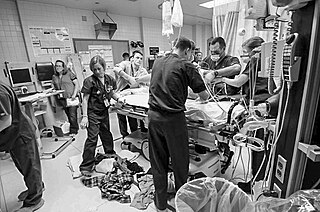
Emergency medicine is the medical speciality concerned with the care of illnesses or injuries requiring immediate medical attention. Emergency physicians specialize in providing care for unscheduled and undifferentiated patients of all ages. As first-line providers, in coordination with emergency medical services, they are primarily responsible for initiating resuscitation and stabilization and performing the initial investigations and interventions necessary to diagnose and treat illnesses or injuries in the acute phase. Emergency medical physicians generally practice in hospital emergency departments, pre-hospital settings via emergency medical services, and intensive care units. Still, they may also work in primary care settings such as urgent care clinics.

Naturopathy, or naturopathic medicine, is a form of alternative medicine. A wide array of practices branded as "natural", "non-invasive", or promoting "self-healing" are employed by its practitioners, who are known as naturopaths. Difficult to generalize, these treatments range from the pseudoscientific and thoroughly discredited, like homeopathy, to the widely accepted, like certain forms of psychotherapy. The ideology and methods of naturopathy are based on vitalism and folk medicine rather than evidence-based medicine, although practitioners may use techniques supported by evidence. The ethics of naturopathy have been called into question by medical professionals and its practice has been characterized as quackery.
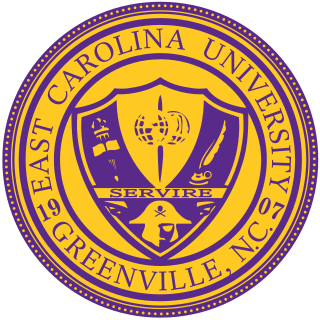
East Carolina University (ECU) is a public university in Greenville, North Carolina, United States. It is the fourth largest university in North Carolina and the only one in the state with schools of medicine, dentistry and engineering.
In the medical profession, a general practitioner (GP) or family physician is a doctor who is a consultant in general practice. GPs have distinct expertise and experience in providing whole person medical care whilst managing the complexity, uncertainty and risk associated with the continuous care they provide. GPs work at the heart of their communities, striving to provide comprehensive and equitable care for everyone, taking into account their health care needs, stage of life and background. GPs work in, connect with and lead multidisciplinary teams that care for people and their families, respecting the context in which they live, aiming to ensure all of their physical and mental health needs are met. They are trained to treat patients to levels of complexity that vary between countries. The term "primary care physician" is more usually used in the US.
Doctor of Medicine is a medical degree, the meaning of which varies between different jurisdictions. In the United States, and some other countries, the M.D. denotes a professional degree. This generally arose because many in 18th-century medical professions trained in Scotland, which used the M.D. degree nomenclature. In England, however, Bachelor of Medicine, Bachelor of Surgery (M.B.B.S.) was used and eventually in the 19th century became the standard in Scotland too. Thus, in the United Kingdom, Ireland and other countries, the M.D. is a research doctorate, honorary doctorate or applied clinical degree restricted to those who already hold a professional degree (Bachelor's/Master's/Doctoral) in medicine. In those countries, the equivalent professional degree to the North American, and some others' usage of M.D. is still typically titled Bachelor of Medicine, Bachelor of Surgery.
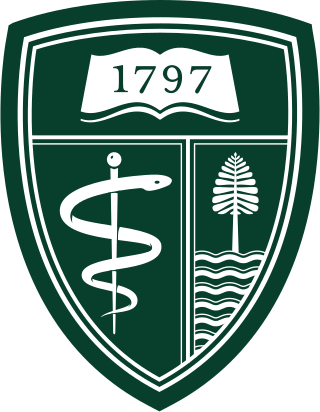
The Geisel School of Medicine at Dartmouth is the graduate medical school of Dartmouth College in Hanover, New Hampshire. The fourth oldest medical school in the United States, it was founded in 1797 by New England physician Nathan Smith. It is one of the seven Ivy League medical schools.

A handbag, commonly known as a purse in North American English, is a handled medium-to-large bag used to carry personal items. It has also been called a pocketbook in parts of the U.S.

Family medicine is a medical specialty within primary care that provides continuing and comprehensive health care for the individual and family across all ages, genders, diseases, and parts of the body. The specialist, who is usually a primary care physician, is named a family physician. It is often referred to as general practice and a practitioner as a general practitioner. Historically, their role was once performed by any doctor with qualifications from a medical school and who works in the community. However, since the 1950s, family medicine / general practice has become a specialty in its own right, with specific training requirements tailored to each country. The names of the specialty emphasize its holistic nature and/or its roots in the family. It is based on knowledge of the patient in the context of the family and the community, focusing on disease prevention and health promotion. According to the World Organization of Family Doctors (WONCA), the aim of family medicine is "promoting personal, comprehensive and continuing care for the individual in the context of the family and the community". The issues of values underlying this practice are usually known as primary care ethics.
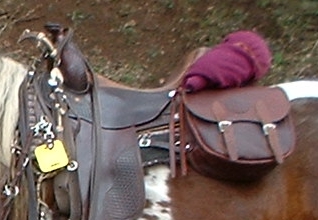
Saddlebags are bags that are attached to saddles.

The Brody School of Medicine at East Carolina University (BSOM) is a public medical school located in Greenville, North Carolina, United States. It offers a Doctor of Medicine program, combined Doctor of Medicine / Master of Public Health and Doctor of Medicine / Master of Business Administration programs, and standalone Doctor of Philosophy and Master of Public Health programs. Brody is a national leader in family medicine, ranking No. 1 in North Carolina and No. 2 nationally in the percentage of graduates who choose careers in family medicine, based on the 2017 American Academy of Family Physicians report on MD-granting medical schools. Brody ranks in the top 10 percent of U.S. medical schools for graduating physicians who practice in the state, practice primary care and practice in rural and underserved areas. Brody graduates currently practice in 83 of North Carolina's 100 counties.

The University of North Carolina School of Medicine is a professional school within the University of North Carolina at Chapel Hill. It offers a Doctor of Medicine degree along with combined Doctor of Medicine / Doctor of Philosophy or Doctor of Medicine / Master of Public Health degrees.
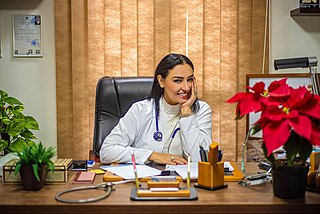
The presence of women in medicine, particularly in the practicing fields of surgery and as physicians, has been traced to the earliest of history. Women have historically had lower participation levels in medical fields compared to men with occupancy rates varying by race, socioeconomic status, and geography.

Leonard Hall is a historic educational building located on the campus of Shaw University in Raleigh, North Carolina. Built in 1881 and originally named Leonard Medical Center, it became known as Leonard Medical School, and then Leonard Hall. It was established when medical schools were professionalizing and was the first medical school in the United States to offer a four-year curriculum. It was also the first four-year medical school that African Americans could attend.
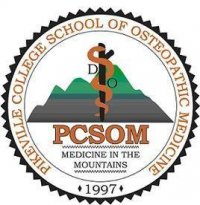
The University of Pikeville - Kentucky College of Osteopathic Medicine (UP-KYCOM) is the medical school of University of Pikeville, a private university affiliated with the Presbyterian Church (USA) and located in Pikeville, Kentucky. UP-KYCOM was established in 1997, grants the Doctor of Osteopathic Medicine degree. It is accredited by the Commission on Osteopathic College Accreditation (COCA) and the Commission on Colleges of the Southern Association of Colleges and Schools.

Annie Lowrie Alexander was an American physician and educator. She was the first licensed female physician in the Southern United States.
Rashid Ali Buttar was an American conspiracy theorist, anti-vaxxer and licensed osteopathic physician. He was known for his controversial use of chelation therapy for numerous conditions, including autism and cancer. He was twice reprimanded by the North Carolina Board of Medical Examiners for unprofessional conduct and cited by the U.S. Food and Drug Administration (FDA) for illegal marketing of unapproved and adulterated drugs. An analysis found that Buttar was one of the top twelve individual and organization accounts producing up to 65% of all anti-vaccine content on Twitter and Facebook.

















